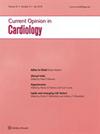将血管重建试验扩大到妇女和服务不足的少数民族,并转向以患者为中心的结果:RECHARGE 试验计划。
IF 2
4区 医学
Q3 CARDIAC & CARDIOVASCULAR SYSTEMS
引用次数: 0
摘要
研究目的我们回顾了为女性和少数民族冠状动脉血运重建决策提供信息的有限可用证据,并介绍了 RECHARGE 试验计划,该计划包括两项独立但整合的平行多中心随机试验,比较冠状动脉旁路移植术 (CABG) 和经皮冠状动脉介入治疗 (PCI),其中一项专门招募女性患者(RECHARGE:Women),另一项专门招募黑人或西班牙裔患者(RECHARGE:Minorities)。最新发现:支持冠状动脉血运重建的大量证据表明,女性、少数民族和少数群体的代表性不足,而且使用的主要复合结果也不尽相同,其组成部分与预后和生活质量(QOL)的关联性也各不相同。RECHARGE 将对参与者进行长达 10 年的随访,在基线、30 天、3 个月、3 年内每 6 个月及之后每年进行一次 QOL 评估。主要终点是全因死亡时间、SF-12v2 身体总分中身体部分与基线相比的时间平均变化、SF-12v2 总分中精神部分与基线相比的时间平均变化的分层复合结果,采用胜率进行评估。独立判定的主要心血管和非心血管不良事件以及疾病特异性 QoL 将作为次要终点。摘要RECHARGE 试验是首个专门招募女性和少数民族患者并以患者为中心的结果作为主要结果的血管再通试验。本文章由计算机程序翻译,如有差异,请以英文原文为准。
Expanding revascularization trials to women and underserved minorities and shifting to patient-centered outcomes: RECHARGE trials program.
PURPOSE OF REVIEW
We review the limited available evidence informing coronary revascularization decisions in women and minorities, and introduce the RECHARGE trial program, which consists of two separate but integrated parallel multicenter, randomized trials comparing coronary artery bypass grafting (CABG) to percutaneous coronary intervention (PCI), one exclusively enrolling women (RECHARGE:Women) and one exclusively enrolling Black or Hispanic patients (RECHARGE:Minorities).
RECENT FINDINGS
The extensive evidence base supporting coronary revascularization suffers from under-representation of women, minorities and minoritized populations, and the use of heterogeneous primary composite outcomes whose components have varying strengths of association with prognosis and quality-of-life (QOL). In RECHARGE, participants will be followed for up to 10 years, with QOL assessments at baseline, 30 days, 3 months, every 6 months for 3 years, and annually thereafter. The primary endpoint is the hierarchical composite of time to all-cause mortality, time-averaged change from baseline in the physical component of the SF-12v2 physical summary score, and time-averaged change from baseline in the mental component of the SF12v2 summary score, evaluated using a win ratio. Independently adjudicated major adverse cardiovascular and noncardiovascular events and disease-specific QoL will be secondary endpoints.
SUMMARY
The RECHARGE trials are the first revascularization trials to enroll exclusively women and minority patients and to use patient-centered outcomes as their primary outcome.
求助全文
通过发布文献求助,成功后即可免费获取论文全文。
去求助
来源期刊

Current Opinion in Cardiology
医学-心血管系统
CiteScore
4.20
自引率
4.30%
发文量
78
审稿时长
6-12 weeks
期刊介绍:
Current Opinion in Cardiology is a bimonthly publication offering a unique and wide ranging perspective on the key developments in the field. Each issue features hand-picked review articles from our team of expert editors. With fourteen disciplines published across the year – including arrhythmias, molecular genetics, HDL cholesterol and clinical trials – every issue also contains annotated reference detailing the merits of the most important papers.
 求助内容:
求助内容: 应助结果提醒方式:
应助结果提醒方式:


